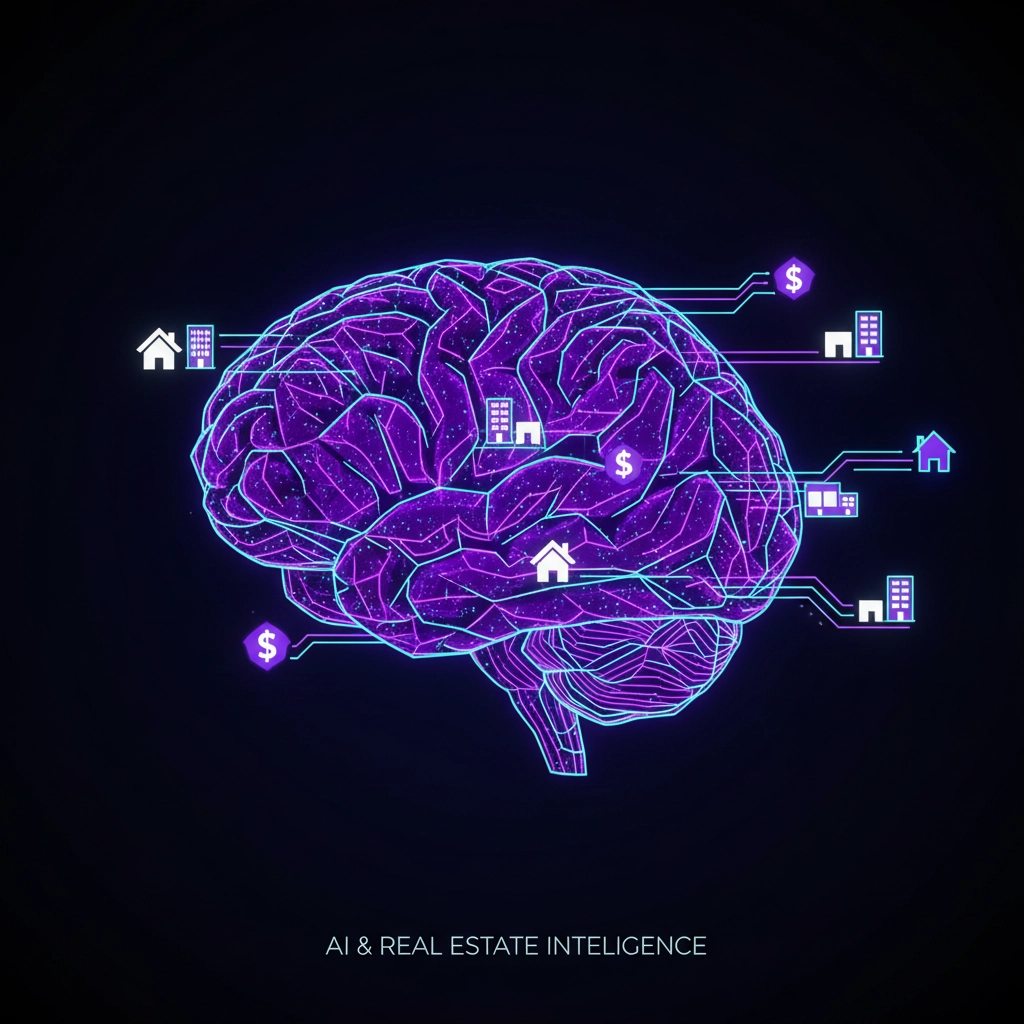The real estate industry has rapidly adopted artificial intelligence technologies. Understanding AI terminology helps agents, brokers, and investors navigate this technological shift effectively. This glossary defines essential AI terms used in real estate contexts.
Core AI Technologies
Artificial Intelligence (AI)
Computer systems that simulate human intelligence processes. In real estate, AI analyzes market data, predicts property values, automates client communications, and streamlines transaction management. Modern AI-powered platforms help agents process leads, schedule appointments, and track performance metrics automatically.
Machine Learning (ML)
A subset of AI where systems learn from data without explicit programming. ML algorithms analyze historical property sales, rental rates, and market trends to identify patterns. Real estate applications include pricing recommendations, lead scoring, and market forecasting.
Deep Learning
Advanced machine learning using multi-layered neural networks. Deep learning processes complex data like property images, neighborhood characteristics, and buyer behavior patterns. Applications include automated property valuations and predictive market analysis.
Algorithm
A set of rules or instructions that AI systems follow to solve problems. Real estate algorithms process data inputs like property features, location data, and market conditions to generate outputs such as price estimates or buyer recommendations.

Natural Language and Communication
Natural Language Processing (NLP)
AI technology that enables computers to understand and generate human language. NLP powers chatbots that answer client inquiries, automated email responses, and contract analysis tools. Real estate platforms use NLP to extract key information from property descriptions and legal documents.
Large Language Model (LLM)
AI systems trained to understand and generate human-like text. Examples include ChatGPT and Claude. Real estate professionals use LLMs to create property listings, generate client newsletters, and draft marketing materials.
Generative AI
AI that creates new content by learning from existing data patterns. In real estate, generative AI produces property descriptions, marketing copy, floor plans, and virtual staging imagery. These tools help agents create professional materials efficiently.
Data and Analytics
Big Data
Large datasets containing property information, market trends, demographic data, and economic indicators. Real estate big data includes MLS records, public property records, mortgage data, and consumer behavior information.
Training Data
Information used to teach AI models how to perform specific tasks. Real estate training data includes historical sales records, property photos, market trends, and transaction outcomes. Quality training data improves AI accuracy and reliability.
Predictive Analytics
AI techniques that forecast future outcomes based on historical data. Real estate predictive analytics estimate property values, identify market trends, and predict buyer behavior. These insights help agents make data-driven decisions.

Computer Vision and Recognition
Computer Vision
AI that analyzes and interprets visual information. Real estate computer vision applications include automated property inspections, image recognition for marketing materials, and virtual tour creation. Systems can identify property features, damage, and renovation needs from photos.
Neural Networks
Computing systems inspired by biological neural networks. In real estate, neural networks process complex data relationships between property characteristics, market conditions, and buyer preferences to generate accurate predictions and recommendations.
Real Estate-Specific Applications
Automated Valuation Model (AVM)
AI systems that estimate property values using market data and statistical models. AVMs analyze comparable sales, property characteristics, and market trends to generate price estimates. These tools provide quick property valuations for lending and investment decisions.
AI Agent
Autonomous AI systems that perform tasks with minimal human oversight. Real estate AI agents handle lead qualification, appointment scheduling, market analysis, and client communications. Unlike traditional automation, AI agents adapt to new information and improve performance over time.
Automated Underwriting
AI systems that evaluate loan applications and assess borrower creditworthiness automatically. These tools analyze financial documents, credit histories, and property information to make lending decisions faster and more consistently.

Machine Learning Approaches
Supervised Learning
Machine learning using labeled training data where correct answers are provided. Real estate supervised learning applications include property price prediction, lead scoring, and market classification. Systems learn by comparing their predictions to known outcomes.
Unsupervised Learning
Machine learning that finds patterns in data without predetermined answers. Real estate applications include customer segmentation, market clustering, and anomaly detection. These systems identify hidden relationships in property and buyer data.
Reinforcement Learning
AI that learns through trial and error, receiving rewards for successful actions. Real estate reinforcement learning optimizes pricing strategies, marketing campaigns, and investment decisions by testing different approaches and learning from results.
Implementation and Tools
Model
The “brain” of any AI system that processes inputs and generates outputs. Real estate models analyze listing descriptions, buyer preferences, and market data to produce recommendations, valuations, and predictions.
API (Application Programming Interface)
Software interfaces that allow different AI systems to communicate and share data. Real estate platforms use APIs to integrate MLS data, market analytics, and communication tools into unified workflows.
Chatbot
AI-powered conversational interfaces that interact with clients through text or voice. Real estate chatbots answer property questions, schedule showings, qualify leads, and provide market information 24/7.

Emerging Technologies
Internet of Things (IoT)
Connected devices that collect and transmit data automatically. Real estate IoT applications include smart home sensors, security systems, and environmental monitors that provide property data for AI analysis.
Blockchain
Distributed ledger technology that ensures secure, transparent transactions. While not AI itself, blockchain works with AI systems to verify property ownership, manage smart contracts, and streamline real estate transactions.
Virtual Reality (VR) and Augmented Reality (AR)
Immersive technologies often enhanced by AI. AI-powered VR creates virtual property tours, while AR overlays property information on real-world views. These technologies help buyers visualize properties remotely.
Performance and Optimization
ROI (Return on Investment)
A metric measuring the profitability of investments. AI helps real estate professionals calculate and optimize ROI by analyzing property performance, market trends, and investment outcomes across portfolios.
Lead Scoring
AI technique that ranks potential clients based on likelihood to convert. Systems analyze buyer behavior, engagement patterns, and demographic data to prioritize leads for agent follow-up.
Conversion Rate
The percentage of leads that become clients or transactions. AI optimization tools test different approaches to improve conversion rates through personalized communications, timing, and content strategies.

Understanding these AI terms enables real estate professionals to evaluate technologies, communicate with vendors, and implement solutions effectively. As AI continues evolving, staying current with terminology helps professionals leverage new tools and maintain competitive advantages.
Modern real estate success increasingly depends on understanding and implementing AI technologies that automate routine tasks while enhancing client service. Professionals who master AI terminology and applications position themselves for long-term success in an increasingly technology-driven industry.
The key to AI adoption lies in starting with clear use cases, understanding the terminology, and gradually implementing tools that solve specific business challenges. This glossary provides the foundation for making informed decisions about AI investments and implementations.




